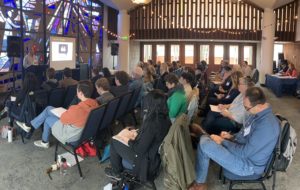“How can one best teach oral history?” This is the question that OHC staff asks every year in anticipation of our annual Advance Oral History Institute, held the week of August 5th this year. Oral history is many things — a research methodology, a mode of inquiry, a field of study, a way of engaging with people — so how does one approach communicating a viable path toward the completion of successful interviews?
A few generations of practitioners, theorists, and teachers have approached this challenge in any number of ways. Some recommend book study to first learn the issues and questions — the overall discourse of oral history — as the best way to achieve sure-footing; others insist that competence in oral history, being primarily about human exchange, is most easily achieved through practice, learning as you go; and some contend that oral history is nothing more than historical research, so pursue it as one would archival study. The correct answer is probably all of the above, or some dynamic mixture thereof.
 In 2014, after hosting probably ten Institutes, new and veteran OHC staff gathered, led by then-new Institute Director Shanna Farrell, to refashion the program and attempt to come up with an optimal way to ‘teach’ oral history over the 5-day program. Farrell came up with the notion of matching the flow of the week to the life-cycle of the interview: Monday focuses on oral history foundations — concepts, theories, and ethics; Tuesday details approaches to project planning and conceptualization; Wednesday naturally examines the complexities of the interview itself; Thursday we delve into strategies for analysis and interpretation of those interviews; and Friday we bring it together by considering various oral history outputs, such as transcripts, podcasts, and books. Along the way, participants engage with the theoretical and methodological literature of oral history; they have the opportunity to witness a ‘live interview’ and then practice interviews of their own; and in small workshop groups they are invited to consider how oral history research might augment and, potentially, transform their own research projects.
In 2014, after hosting probably ten Institutes, new and veteran OHC staff gathered, led by then-new Institute Director Shanna Farrell, to refashion the program and attempt to come up with an optimal way to ‘teach’ oral history over the 5-day program. Farrell came up with the notion of matching the flow of the week to the life-cycle of the interview: Monday focuses on oral history foundations — concepts, theories, and ethics; Tuesday details approaches to project planning and conceptualization; Wednesday naturally examines the complexities of the interview itself; Thursday we delve into strategies for analysis and interpretation of those interviews; and Friday we bring it together by considering various oral history outputs, such as transcripts, podcasts, and books. Along the way, participants engage with the theoretical and methodological literature of oral history; they have the opportunity to witness a ‘live interview’ and then practice interviews of their own; and in small workshop groups they are invited to consider how oral history research might augment and, potentially, transform their own research projects.
Over the past year or so, in our newsletter we have featured profiles of several Institute ‘graduates’ — individuals who have achieved great things through their own hard work, work that we like to think the Institute has informed and maybe even improved. The plan for this year is to live-tweet parts of the Institute, so please follow us on twitter if you don’t already. And while our 2019 Institute is sold-out, it is not too early to plan for 2020 (dates coming soon!).
Martin Meeker, Charles B. Faulhaber Director